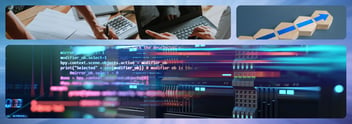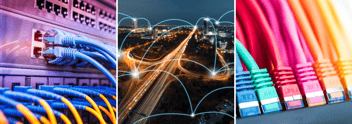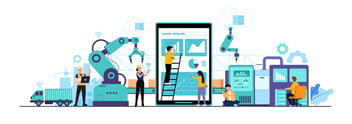Six factors to choose the perfect Data Center for your company

Sandra Milena Vasco Echeverri
Data storage is one of the cornerstones of any company in the digital age. Therefore, selecting the right data center is essential to ensure secure, reliable, and efficient data storage. A quality data center can offer a range of benefits, such as faster data access, lower latency, and greater capacity to handle intensive workloads.
Factors to consider when choosing a Data Center
When selecting a data center, there are several key factors you must consider to ensure it meets your storage needs and is compatible with your infrastructure and business operations. The following are the most important aspects to consider:
1. Data Center Location and Proximity to Your Company.
The geographical location of the data center is a critical factor to consider, as it will affect latency and response time for your services. It's desirable for the data center to be as close as possible to your company and your primary users or customers. This will minimize latency and ensure a faster and smoother user experience. Moreover, having the data center near your company will provide you with greater control and physical access to your data, which can be important in emergencies or special operational needs.
2. Connectivity options and network infrastructure.
Ensure you evaluate the connectivity options available at the data center, such as fiber optic connections and internet service providers (ISPs). A data center with multiple connectivity options and a robust network infrastructure will provide you with greater flexibility and capacity to scale your services.Additionally, consider the redundancy of the data center's network infrastructure. This involves assessing whether the data center has redundant network routes, failover switching systems, and other measures to ensure service continuity in case of network interruptions or failures. A redundant network infrastructure will minimize the risk of downtime and ensure greater availability of your services.
3. Physical infrastructure, power systems, and cooling
|
TIER |
% Availability |
% Downtime |
Annual Downtime |
|
TIER I |
99,67% |
0,33% |
28,82 hours |
|
TIER II |
99,74% |
0,25% |
22,68 hours |
|
TIER III |
99, 982 % |
0,02% |
1,57 hours |
|
TIER IV |
100,00% |
0,01% |
52,56 minutes |
You should also verify the characteristics of the clean area or white room, which is the heart of the data center where equipment cabinets or racks are installed.
Currently, one of the most significant challenges in data center infrastructure is the power per rack or equipment power density (e.g., servers, routers, switches, etc.).
This means that in one rack, you can install equipment that is highly efficient, state-of-the-art, with high traffic density but also with high power consumption, high heat dissipation, and substantial weight, and not all data centers can accommodate them.
Based on the construction design, data centers can be classified into three load categories (the average electrical power with which equipment racks can be energized):
- Low from 3 kW - 5 kW
- Medium from 5 kW – 10 kW
- High from 10 kW – 20 kW.
Therefore, when choosing a data center, it's important to know the technical requirements of your IT equipment and consider:
- Load category classification.
- Temperature and humidity control.
- Management of hot and cold aisles, using containment if necessary.
- Floor load-bearing capacity (kg/m2) to support the weight of racks and their equipment.
- Dimensions of corridors, doors, elevators, or ramps for rack and equipment access, from the unloading area to the clean area, without presenting any mechanical risk to equipment and people.
- Proper distribution of cable trays for electrical circuits, data, and/or fiber optics.
- Fire detection and extinguishing systems.
- Fire barriers.
- Lighting control.
Another important aspect of the data center is energy efficiency, measured by the PUE (Power Utilization Effectiveness).
All management, administration, and maintenance of the data center should focus on availability and achieving a PUE closer to 1, through the implementation of best practices and infrastructure optimization.
4.Evaluation of Data Center security measures
Your data is one of your most valuable assets, so it's essential to ensure effective protection against physical and cyber threats. Be sure to assess the security measures implemented by the data center, both in terms of physical security and cybersecurity.
Regarding physical security, check if the data center has video surveillance systems, physical access controls, intruder detection systems, and fire protection measures. These measures will ensure that your data is protected from unauthorized individuals, theft, or physical damage.
Concerning cybersecurity, make sure to evaluate if the data center has intrusion detection and prevention systems, firewalls, malware protection systems, and other online security measures. It's also important to verify if the data center conducts regular security audits and has dedicated cybersecurity personnel. These measures will protect your data from cyberattacks and other online threats.
5. Scalability and flexibility of the Data Center
The ability to scale your storage services is essential to adapt to your company's growth. Be sure to assess the scalability and flexibility of the data center in terms of additional storage, increased processing capacity, and other resources needed to meet your future requirements.
A data center that cannot accommodate your evolving needs may limit your company's growth and require data migration to another provider in the future. Therefore, it's crucial to choose a data center that offers scalability and flexibility options aligned with your long-term plans.
6. Cost considerations for Data Center selection
Cost is another important factor to consider when choosing a data center. It's essential to evaluate the total cost of ownership (TCO) of the data center, which includes not only initial costs like installation and configuration but also recurring costs such as space rental, power, and connectivity services.
Make sure to compare prices from different data center providers and assess which services are included in the cost and which are additional. Also, consider the contracts and service level agreements (SLAs) offered by the data center, which will establish the terms and conditions of your relationship with the provider. Carefully evaluate the costs and benefits offered by each provider before making a final decision.
Conclusion: Finding the Perfect Data Center for Your Storage Needs
When comparing different data center providers, take into account the costs associated with location, connectivity, physical infrastructure, redundancy, energy efficiency, service continuity, data and equipment security, and scalability.
Some data centers may offer lower prices but may compromise quality and security.
Additionally, be sure to analyze the contracts and service level agreements (SLAs) offered by the data center. This will help you better understand additional costs, renewal periods, and cancellation policies.
Don't forget to consider the long-term benefits when selecting a data center. A reliable and secure data center can help avoid costly disruptions and protect your valuable data.

Sandra Milena Vasco Echeverri
Electrical engineer with a specialization in Project Management, Project Management Professional (PMP). I have been part of the Project Management team at Internexa for 13 years, and my involvement in the design, management, and direction of physical infrastructure projects for the development of telecommunications nodes and data centers has given me the wonderful opportunity to interact with work teams in Peru, Chile, Brazil, and Colombia, sparking a fascination for all cultures within me.


.jpeg)



.jpeg?width=352&name=Internet%20para%20empresas%20(1).jpeg)







.jpeg?width=352&name=5g%20(1).jpeg)